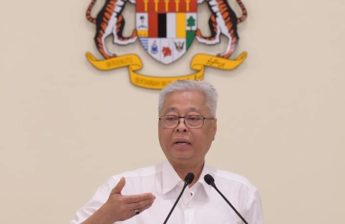When Health Minister Khairy Jamaluddin first announced in a December 12 TV interview that the government planned to amend Act 342 to impose harsher penalties of maximum RM10,000 and RM1 million compounds for individuals and businesses respectively over Covid-19 offences, I was completely taken aback.
My shock and horror grew over the next few days after the government tabled its proposed amendments to the Prevention and Control of Infectious Diseases Act on December 14, which included, among other draconian provisions, penalties for individuals upon conviction with a jail term of up to seven years, a maximum RM100,000 fine, or both.
It was only when I looked at several offences listed in the Penal Code, particularly violent crimes that result in physical harm like causing death by negligence and attempted homicide, that I realised the extreme and disproportionate nature of seven-year imprisonment for minor Covid infractions like not wearing a face mask or not physically distancing.
The fierceness of the ensuing moral outrage cutting across racial lines from the Malay, Chinese, and Indian communities, and other ethnic groups took me off-guard. Not only did civil societies register their protests, like Undi18’s anti-Pindaan 342 graphic and Angkatan Belia Islam Malaysia (ABIM)’s petition, constituents from Segambut in Kuala Lumpur to Kulim-Bandar Baharu in Kedah asked their Members of Parliament to vote against the Act 342 amendment Bill.
I have never seen such grassroots advocacy against a piece of legislation, without any central leadership organising a movement too. In the past, any protests against issues like corruption were organised by large non-government organisations like Bersih. This time, even the Bar Council and the usual human rights groups were silent about the Act 342 amendment Bill despite its oppressive provisions.
For decades, we Malaysians have always been told that the only time we can effect change is through the ballot box once every five years. The public euphoria from Barisan Nasional’s (BN) historic fall from power in 2018 quickly evaporated with various political shenanigans, starting with the Sheraton Move in February 2020 that subsequently led to three prime ministers in just three years since 2018.
Under BN’s long six-decade rule, the Umno-led coalition crippled democracy and disempowered the people, as Parliament was turned into a rubber stamp for the government. Government Bills, usually drafted by civil servants in Putrajaya far-removed from the realities on the ground, passed the Dewan Rakyat easily without any prior consultation with Opposition lawmakers, stakeholders, and ordinary citizens. The Dewan Negara, with unelected Senators, was even more of a rubber stamp.
After the Dewan Rakyat health, science and innovation committee met with Khairy and six external experts from the health care sector early this morning, the health minister subsequently withdrew the Bill and said he would re-table it in the next Dewan Rakyat meeting in February after further stakeholder engagements to get bipartisan support in Parliament. All six experts, including World Health Organization science council member and infectious disease expert Prof Dr Adeeba Kamarulzaman, had, at the health committee meeting, urged the government to withdraw the Bill.
As a libertarian, I personally do not support any criminalisation of infectious disease, including Covid-19. Public health measures for the public should be implemented through education and expert recommendations, not through criminal enforcement, especially with a new and complex virus with constantly evolving science. For instance, at the start of the pandemic, temperature checks were thought to be necessary, but now we know that these are useless since Covid-19 can be transmitted by asymptomatic or pre-symptomatic people.
Criminal sanctions cannot be used to control the transmission of disease because while typical crimes like assault have direct cause-and-effect (a person beats someone up, causing injury) and are thus more straightforward to enforce, how do you prove that non-compliance with standard operating procedures (SOPs) like not wearing a face mask or not physically distancing causes Covid-19 infection?
Even with previous Covid-19 outbreaks at vaccination centres (PPVs), the Ministry of Health (MOH) said initially that the 204 cases at the Ideal Convention Centre (IDCC) PPV reported last July could not yet be identified as a “cluster” without evidence of epidemiological links between one case and another.
So, with that in mind, how can enforcement authorities issue compounds on the spot to businesses or individuals that breach Covid-19 SOPs without evidence that such infractions caused someone to get infected, as infections will only get reported later? Even with contact tracing, amid widespread community transmission of a respiratory disease, it’s extremely difficult to prove that an infection or cluster originated from a certain individual or place. An index case is simply the first reported case, not the definitive case that caused other infections. Furthermore, despite perfect compliance with SOPs, people can still get infected.
If some manufacturing companies are truly repeat SOP offenders, and if authorities strongly believe that certain corporations are responsible for Covid-19 deaths, then, by all means, charge them in court instead of issuing an RM1 million or RM500,000 compound. Compounds are offered only for light offences, i.e. an offence is considered too minor to be charged in court, hence a compound is offered. But accusing someone of causing death is a serious allegation and thus, should be prosecuted in court, where the criminal justice system decides, based on evidence, if a person or a business was indeed responsible for causing Covid-19 deaths by negligence of SOPs.
Defining Covid offences based on the risk of transmission is even more arbitrary. Is it worse to not wear a face mask or to not physically distance? Is it worse to have a beer in a pub, like drinking coffee in a restaurant, or to go to an indoor crowded convention with thousands of visitors? Is it worse to provide congested accommodation facilities for workers, or to organise a massive government event and to spam the phone numbers of 32 million people to go to said event?
Differentiating punishments for Covid-19 offences based on an individual or company’s socioeconomic or financial background also appears unlawful and unconstitutional, since Article 8 of the Federal Constitution guarantees equality before the law. Criminal penalties are given based on the severity of offence (for example, murder is obviously worse than theft). Police don’t issue a higher summons to the driver of a Vellfire than to the driver of a Perodua Kancil for the same parking offence.
Any revised version of the Act 342 amendment Bill also cannot exclude government agencies or ministries and civil servants from prosecution or compounds. Such an exclusion is a double standard and violates the constitutional provision of equality before the law.
If MOH wants greater resources to fight the pandemic, including the imminent threat of Omicron, I would rather the government give more money to MOH to recruit more doctors and health care workers, to create more hospital beds, to do more genomic sequencing tests, to automate contact tracing, and to promote booster vaccinations, instead of enhancing penalties for breaking Covid-19 rules.
Khairy’s deferral of proposed amendments to Act 342 marks an historic moment in Malaysian legislature, where, for once, a government Bill went through the process of consultation and negotiation with Opposition MPs and stakeholders, like in mature democracies in the United Kingdom and the United States. The Act 342 amendment Bill, in fact, went through two revisions after its tabling for first reading amid public outrage.
Today’s postponement of the Act 342 amendment Bill is a victory for the people. Malaysians have the power to effect change at the institutional and legislative level in between elections. The awakening of the people has only just begun.

Boo Su-Lyn is CodeBlue editor-in-chief. She is a libertarian, or classical liberal, who believes in minimal state intervention in the economy and socio-political issues.








